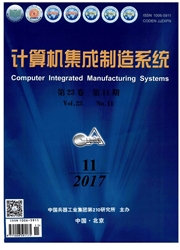

 中文摘要:
中文摘要:
To improve the performance of an automated material handling system (AMHS) in 300 mm semiconductor fabrication plants (FABs), an overhead-hoist-transport (OHT) vehicle dispatching problem was described for semiconductor FABs. An original wafer lot dispatching policy was proposed. To minimize costs due to transportation logic, a dispatching rule based on an adapted Hungarian algorithm was presented, and six factors were considered. In addition to the recurring parameters, two original parameters of the vehicles utilization and wafer lot priority were considered to evaluate system performance. To obtain a balanced efficiency regarding the FAB output factors, simulation and sensitive analysis were used to find the best weight parameters of the cost matrix. In particular, a high rate of priority wafer lots (greater than 20%) and vehicles utilization (greater than 75%) are obtained without penalizing the efficiency of the FABs. The results indicate that the proposed dispatching policy is valid and practical.
 英文摘要:
英文摘要:
To improve the performance of an automated material handling system (AMHS) in 300 mm semiconductor fabrication plants ( FABs ), an overhead-hoist-transport ( OHT ) vehicle dispatching problem was described for semiconductor FABs. An original wafer lot dispatching policy was proposed. To minimize costs due to transportation logic, a dispatching rule based on an adapted Hungarian algorithm was presented, and six factors were considered. In addition to the recurring parameters, two original parameters of the vehicles utilization and wafer lot priority were considered to evaluate system performance. To obtain a balanced efficiency regarding the FAB output factors, simulation and sensitive analysis were used to find the best weight parameters of the cost matrix. In particular, a high rate of priority wafer lots ( greater than 20 % ) and vehicles utilization ( greater than 75 % ) are obtained without penalizing the efficiency of the FABs. The results indicate that the proposed dispatching policy is valid and practical.
 同期刊论文项目
同期刊论文项目
 同项目期刊论文
同项目期刊论文
 A multiple-criteria real-time scheduling approach for multiple-load carriers subject to LIFO loading
A multiple-criteria real-time scheduling approach for multiple-load carriers subject to LIFO loading Try and error-based scheduling algorithm for cluster tools of wafer fabrications with residency time
Try and error-based scheduling algorithm for cluster tools of wafer fabrications with residency time Modelling and scheduling analysis of multi-cluster tools with residency constraints based on time co
Modelling and scheduling analysis of multi-cluster tools with residency constraints based on time co Heuristic tabu search scheduling algorithm for wet-etching systems in semiconductor wafer fabricatio
Heuristic tabu search scheduling algorithm for wet-etching systems in semiconductor wafer fabricatio Scheduling method for single-arm cluster tools of wafer fabrications with residency and continuous r
Scheduling method for single-arm cluster tools of wafer fabrications with residency and continuous r An efficient analytical method for performance evaluation of transfer lines with unreliable machines
An efficient analytical method for performance evaluation of transfer lines with unreliable machines 期刊信息
期刊信息
